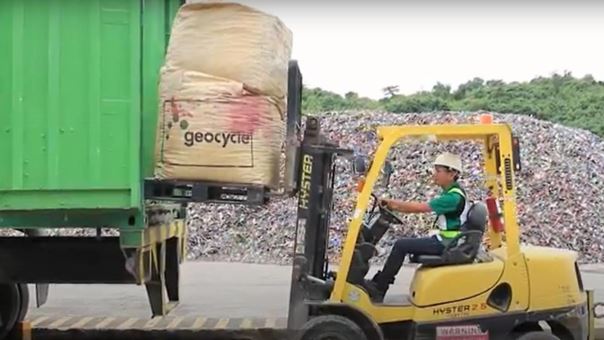MANILA, Philippines – To strengthen environmental performance and efficiency of operations, leading building solutions provider Holcim Philippines, Inc. will invest Php121.5 million until 2022 on improving waste management unit Geocycle’s ability to drive use of alternative fuels and raw materials in cement production at its Bulacan plant.
Holcim Philippines will invest to raise the efficiency of shredding operations to convert qualified waste materials to alternative fuels, install new equipment, and improve storage and feeding facilities at its cement plant in Norzagaray, Bulacan. These will enable its Geocycle unit to support the company’s Bulacan plant in using more qualified post-consumer and municipal solid wastes as alternative fuels instead of coal.
Holcim Philippines President and CEO John Stull: “Over the years, our Geocycle unit has enabled us to help communities and business partners all over the country manage their wastes in a sustainable manner as we produce essential building materials on a more cost- efficient and environment-friendly manner. This investment ensures we can continue being a reliable partner in the country’s sustainable development, while also meeting our objectives of making our operations more efficient and respectful of nature.”
The use of alternative fuels and raw materials in producing cement is a key focus of Holcim Philippines to lower the carbon footprint and consumption of non-renewable resources in its operations. This is aligned with the goals of the global building materials leader LafargeHolcim Group to further make operations sustainable.
Holcim Philippines is one of the pioneers in using qualified wastes such as non-recyclable plastics and biomass as alternative fuels in cement manufacturing through co-processing technology since 2003. In co-processing, qualified waste materials are pre-processed as alternative fuel and fed into the high-temperature kilns along with other traditional fuels to produce cement. This process transforms wastes to alternative fuel and converts these into energy for cement production. The technology is recognized globally and is approved by the Philippine authorities due to its proven advantages in environmental and safety performance.
In 2020, Holcim Philippines co-processed close to 130,000 tons of qualified wastes from local governments, industry partners and agricultural processors in its plants in Luzon and Mindanao led by its Geocycle unit.
— The Summit Express
 |
| Holcim Philippines invests on new alternative fuel processing facility to strengthen position in waste management, low carbon fuel. Handout photo |
Holcim Philippines will invest to raise the efficiency of shredding operations to convert qualified waste materials to alternative fuels, install new equipment, and improve storage and feeding facilities at its cement plant in Norzagaray, Bulacan. These will enable its Geocycle unit to support the company’s Bulacan plant in using more qualified post-consumer and municipal solid wastes as alternative fuels instead of coal.
Holcim Philippines President and CEO John Stull: “Over the years, our Geocycle unit has enabled us to help communities and business partners all over the country manage their wastes in a sustainable manner as we produce essential building materials on a more cost- efficient and environment-friendly manner. This investment ensures we can continue being a reliable partner in the country’s sustainable development, while also meeting our objectives of making our operations more efficient and respectful of nature.”
The use of alternative fuels and raw materials in producing cement is a key focus of Holcim Philippines to lower the carbon footprint and consumption of non-renewable resources in its operations. This is aligned with the goals of the global building materials leader LafargeHolcim Group to further make operations sustainable.
Holcim Philippines is one of the pioneers in using qualified wastes such as non-recyclable plastics and biomass as alternative fuels in cement manufacturing through co-processing technology since 2003. In co-processing, qualified waste materials are pre-processed as alternative fuel and fed into the high-temperature kilns along with other traditional fuels to produce cement. This process transforms wastes to alternative fuel and converts these into energy for cement production. The technology is recognized globally and is approved by the Philippine authorities due to its proven advantages in environmental and safety performance.
In 2020, Holcim Philippines co-processed close to 130,000 tons of qualified wastes from local governments, industry partners and agricultural processors in its plants in Luzon and Mindanao led by its Geocycle unit.
— The Summit Express
